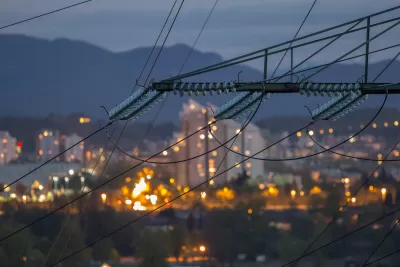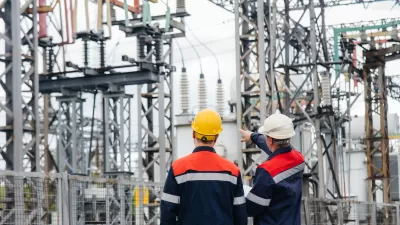Discover how machine learning optimizes city utility management for enhanced efficiency and reduced operational costs.

Urban planners face the ongoing challenge of managing city utilities efficiently and reliably. As cities grow, the complexity of maintaining water, electricity, and waste management infrastructures increases. Machine learning offers promising solutions to enhance utility management, providing tools for optimized resource allocation and distribution, predictive maintenance, and adaptive systems.
Explore how urban planners can leverage machine learning to improve municipal utility services, detailing specific applications and addressing the challenges and benefits of integrating this technology.
Optimized energy distribution
Machine learning can enhance the efficiency of electricity distribution in real time by analyzing consumption patterns.
Enhancing grid efficiency
Smart grids with machine learning capabilities can analyze consumption patterns and optimize energy distribution in real time. This strategy ensures that electricity is delivered where and when needed most, reducing waste and improving overall grid efficiency.
Demand forecasting
Machine learning algorithms can also forecast energy demand by analyzing historical weather patterns, usage data, and other influencing factors. Accurate demand forecasting allows utility companies to manage energy production and storage better, reducing the reliance on non-renewable energy sources and lowering operational costs.
Predictive maintenance for infrastructure
Machine learning enables urban planners to proactively maintain utility infrastructure by predicting potential failures before they occur.
Proactive problem solving
Machine learning can revolutionize utility infrastructure maintenance by shifting from reactive to proactive strategies. By examining past data and recognizing patterns, machine learning algorithms can anticipate when infrastructure components are prone to failure. This advantage allows urban planners to schedule maintenance activities before problems arise, reducing downtime and preventing costly emergency repairs.
Case Study: Water Systems
In water management, predictive maintenance can monitor pipelines and detect anomalies that indicate potential leaks or bursts. Sensors placed along the network collect data on pressure, flow rates, and temperature, which machine learning algorithms analyze to predict failures. Early intervention can minimize water loss and environmental damage while maintaining consistent service to residents.
Adaptive water management systems
Machine learning helps create intelligent water networks that adapt to usage patterns and environmental conditions.
Smart water networks
Machine learning enables the creation of smart water networks that adapt to changing usage patterns and environmental conditions. These systems can monitor and adjust water distribution for optimal performance and conservation. For example, during periods of drought, machine learning algorithms can prioritize water delivery to critical areas and reduce supply to non-essential services.
Real-time monitoring
Real-time monitoring of water quality and consumption can help urban planners quickly identify issues such as contamination or excessive usage. Machine learning algorithms can detect unusual patterns and alert authorities to take immediate action, ensuring the safety and sustainability of the water supply.
Integration challenges
Implementing machine learning in utility management comes with its own set of challenges.
Data management
One of the primary challenges in integrating machine learning into utility management is handling the vast amounts of data required. Urban planners must ensure that they have robust data collection and storage systems in place. This strategy involves investing in sensors, IoT devices, and reliable communication networks to gather accurate and comprehensive data.
Skills gaps
Implementing machine learning solutions also requires specialized knowledge and expertise. Urban planners must collaborate with data scientists and machine learning experts to develop and maintain these systems. Training existing staff or hiring new talent with the necessary skills can be a significant hurdle.
Security concerns
Security and privacy are paramount, as with any technology that relies on extensive data collection. Urban planners must address their machine learning systems' potential vulnerabilities to protect sensitive information and maintain public trust.
Benefits of machine learning
One significant benefit of using machine learning in utility management is the potential for cost savings. Predictive maintenance reduces the need for expensive emergency repairs while better forecasting of electricity demand and optimized source distribution minimize waste and lower operational expenses. Over time, these savings can be significant, allowing cities to invest in further improvements.
Additionally, machine learning enhances the reliability and efficiency of utility services, leading to better outcomes for residents. Consistent and high-quality services improve the quality of life for city dwellers and can attract new businesses and residents to the area.
Embracing machine learning for smarter, more resilient city utilities
Machine learning holds significant promise for urban planners aiming to optimize city utility management. Leveraging predictive maintenance, optimized energy distribution, and adaptive water management systems can help cities enhance efficiency, reduce costs, and improve overall service delivery.
Despite the challenges of data management, skill gaps, and security concerns, the benefits of integrating machine learning into utility management are clear. Embracing these technologies can lead to smarter, more resilient urban infrastructure, ultimately benefiting residents and the environment.

Maui's Vacation Rental Debate Turns Ugly
Verbal attacks, misinformation campaigns and fistfights plague a high-stakes debate to convert thousands of vacation rentals into long-term housing.

Planetizen Federal Action Tracker
A weekly monitor of how Trump’s orders and actions are impacting planners and planning in America.

Chicago’s Ghost Rails
Just beneath the surface of the modern city lie the remnants of its expansive early 20th-century streetcar system.

Bend, Oregon Zoning Reforms Prioritize Small-Scale Housing
The city altered its zoning code to allow multi-family housing and eliminated parking mandates citywide.

Amtrak Cutting Jobs, Funding to High-Speed Rail
The agency plans to cut 10 percent of its workforce and has confirmed it will not fund new high-speed rail projects.

LA Denies Basic Services to Unhoused Residents
The city has repeatedly failed to respond to requests for trash pickup at encampment sites, and eliminated a program that provided mobile showers and toilets.
Urban Design for Planners 1: Software Tools
This six-course series explores essential urban design concepts using open source software and equips planners with the tools they need to participate fully in the urban design process.
Planning for Universal Design
Learn the tools for implementing Universal Design in planning regulations.
planning NEXT
Appalachian Highlands Housing Partners
Mpact (founded as Rail~Volution)
City of Camden Redevelopment Agency
City of Astoria
City of Portland
City of Laramie






























